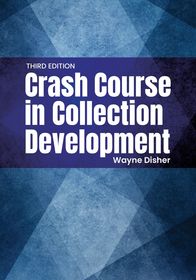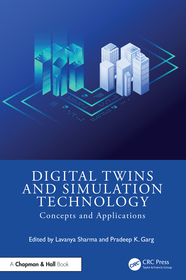
Crash Course in Collection Development
-
13% KEDVEZMÉNY?
- A kedvezmény csak az 'Értesítés a kedvenc témákról' hírlevelünk címzettjeinek rendeléseire érvényes.
- Kiadói listaár GBP 49.99
-
23 882 Ft (22 745 Ft + 5% áfa)
Az ár azért becsült, mert a rendelés pillanatában nem lehet pontosan tudni, hogy a beérkezéskor milyen lesz a forint árfolyama az adott termék eredeti devizájához képest. Ha a forint romlana, kissé többet, ha javulna, kissé kevesebbet kell majd fizetnie.
- Kedvezmény(ek) 13% (cc. 3 105 Ft off)
- Kedvezményes ár 20 778 Ft (19 788 Ft + 5% áfa)
Iratkozzon fel most és részesüljön kedvezőbb árainkból!
Feliratkozom
23 882 Ft

Beszerezhetőség
Megrendelésre a kiadó utánnyomja a könyvet. Rendelhető, de a szokásosnál kicsit lassabban érkezik meg.
Why don't you give exact delivery time?
A beszerzés időigényét az eddigi tapasztalatokra alapozva adjuk meg. Azért becsült, mert a terméket külföldről hozzuk be, így a kiadó kiszolgálásának pillanatnyi gyorsaságától is függ. A megadottnál gyorsabb és lassabb szállítás is elképzelhető, de mindent megteszünk, hogy Ön a lehető leghamarabb jusson hozzá a termékhez.
A termék adatai:
- Kiadás sorszáma 3
- Kiadó Bloomsbury Publishing (UK)
- Megjelenés dátuma 2023. június 15.
- Kötetek száma Paperback
- ISBN 9781440880438
- Kötéstípus Puhakötés
- Terjedelem208 oldal
- Méret 252x176x12 mm
- Súly 400 g
- Nyelv angol 470
Kategóriák
Hosszú leírás:
The third edition of Crash Course in Collection Development is a must-have for librarians just entering the field and professionals in need of a refresher in effective library operations. It now covers all aspects of collection development and management - including inventory assessment, market analysis, budgeting, marketing, and customer service - in all library environments including public, academic, and school libraries.
Focusing on collection development basics, it begins with information on gathering statistics and analyzing community needs to design a collection that meets user needs. It goes on to guide users in writing a collection development policy, budgeting, selecting materials, managing vendor relations, understanding the publishing industry, merchandising and promoting the collection, and handling complaints.
Newly included in the third edition is a discussion of new purchasing and lending models; information for academic and school librarians; and such new trends as libraries as spaces for users, collection diversity issues, makerspaces, nontraditional collections, pop-up libraries, the digital divide, and noncirculating collections.
Author Wayne Disher has once again written a practical and simple introduction to an important, complex, and evolving area of library service.
Tartalomjegyzék:
Introduction to the Third Edition
1. Library Collections
What Is a Collection?
Initial Issues to Consider
Types of Collections
Needs, Wants, and Demands
2. The Library and Its Community
Types of Library Communities
The Goals of a Community Analysis
Basic Steps
Finishing Steps of Your Analysis
3. Collection Assessment and Evaluation
The Value of Your Collection
Evaluations and Assessments
When to Perform a Collection Evaluation
The Goal of a Collection Evaluation
Starting a Collection Evaluation
Collection Evaluation Techniques
4. Collection Use and Statistics for Collection Developers
Why Collect Data about Your Collection?
Types of Data
Types of Collections
Common Formulas and Measures for Collection Developers
Presenting and Reporting Your Statistics
5. Collection Development Policies
The Purpose of a Collection Development Policy
The Ideal Collection Development Policy
Are Collection Development Policies Useful in Today's Libraries?
Elements of a Collection Development Policy
Before Writing Your Own Collection Development Policy
Sharing Your Collection Development Policy
6. Managing Collection Budgets
The Budget Cycle
What You Will Need to Prepare Your Collection Budget
Budget Allocations
Budget Challenges
Avoiding Problems by Improving Budgeting Skills
7. Selecting Library Materials
Selection Philosophies
Personal Preparations Before You Start to Select
Popular Selection Criteria
Selecting Materials Other Than Books
Poular Selection Tools
8. Reviews and Reviewing Sources
The Purpose of a Review
A Standard Review
The Limitations of a Review
Finding Reviews
Popular Library Review Sources
9. Acquisitions
Selecting a Vendor
Purchasing Basics
Purchasing and Lending Models
Preparing Your Order
Finding the Item
Types of Purchases
Finishing Acquisitions
10. The Publishing Industry
What Is a Publisher?
The Process of Publishing a Book
Various Types of Publishers
Top Publishers in the World
Printing
Publishing Terminology
The Library and Publisher Relationship
11. Collection Maintenance
Deleting Material, or Weeding
The Weeding Process
12. Mending and Preserving
Common Misconceptions
Common Problems
Material Protection
13. Collection Promotion and Merchandising
Why Merchandise and Promote Our Collections?
Understanding User Behavior
Types of Collection Merchandising and Promotion
Challenges of Merchandising and Promotion
14. Handling Complaints about the Collection
Complaints versus Challenges
Intellectual Freedom
Planning for Complaints and Challenges
A Typical Complaint-Handling Process
Internal Censorship
15. Collections for the Digital Age
What Is an Electronic Collection?
Why Electronic Collections and eBooks?
Advantages of Electronic Material
Disadvantages of Electronic Material
Questions of Ownership
Licensing and Access Basics
Content Options
Download Options
Remote Access Considerations
Electronic Selection Criteria
The Digital Future
Conclusion
Index





